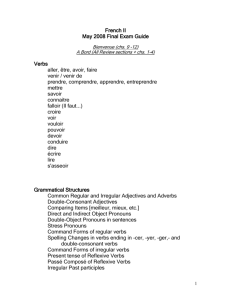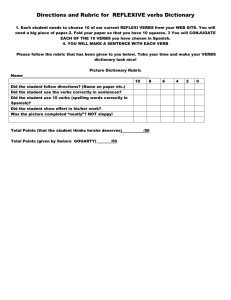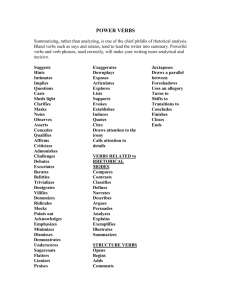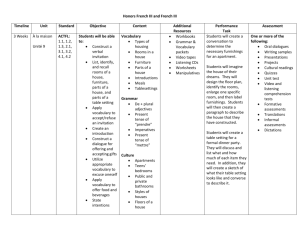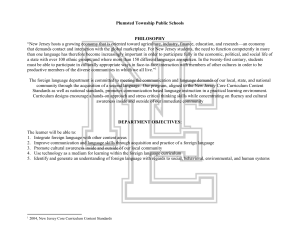Unité 1
advertisement
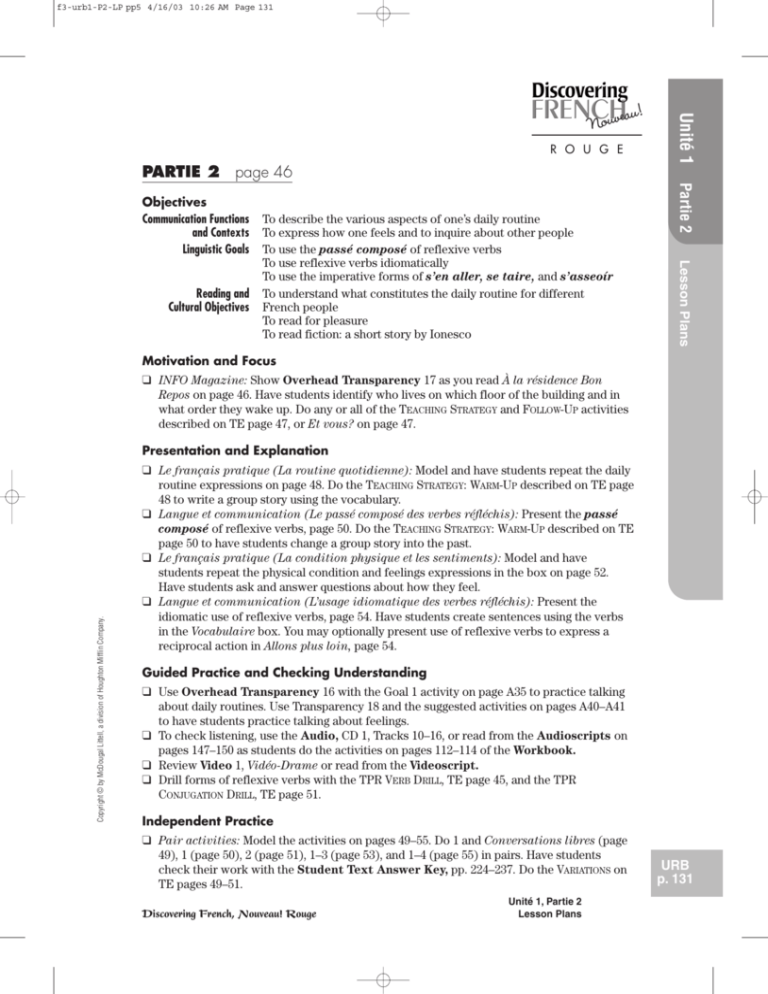
f3-urb1-P2-LP pp5 4/16/03 10:26 AM Page 131 PARTIE 2 page 46 Lesson Plans Reading and Cultural Objectives To describe the various aspects of one’s daily routine To express how one feels and to inquire about other people To use the passé composé of reflexive verbs To use reflexive verbs idiomatically To use the imperative forms of s’en aller, se taire, and s’asseoír To understand what constitutes the daily routine for different French people To read for pleasure To read fiction: a short story by Ionesco Partie 2 Objectives Communication Functions and Contexts Linguistic Goals Unité 1 R O U G E Motivation and Focus ❑ INFO Magazine: Show Overhead Transparency 17 as you read À la résidence Bon Repos on page 46. Have students identify who lives on which floor of the building and in what order they wake up. Do any or all of the TEACHING STRATEGY and FOLLOW-UP activities described on TE page 47, or Et vous? on page 47. Copyright © by McDougal Littell, a division of Houghton Mifflin Company. Presentation and Explanation ❑ Le français pratique (La routine quotidienne): Model and have students repeat the daily routine expressions on page 48. Do the TEACHING STRATEGY: WARM-UP described on TE page 48 to write a group story using the vocabulary. ❑ Langue et communication (Le passé composé des verbes réfléchis): Present the passé composé of reflexive verbs, page 50. Do the TEACHING STRATEGY: WARM-UP described on TE page 50 to have students change a group story into the past. ❑ Le français pratique (La condition physique et les sentiments): Model and have students repeat the physical condition and feelings expressions in the box on page 52. Have students ask and answer questions about how they feel. ❑ Langue et communication (L’usage idiomatique des verbes réfléchis): Present the idiomatic use of reflexive verbs, page 54. Have students create sentences using the verbs in the Vocabulaire box. You may optionally present use of reflexive verbs to express a reciprocal action in Allons plus loin, page 54. Guided Practice and Checking Understanding ❑ Use Overhead Transparency 16 with the Goal 1 activity on page A35 to practice talking about daily routines. Use Transparency 18 and the suggested activities on pages A40–A41 to have students practice talking about feelings. ❑ To check listening, use the Audio, CD 1, Tracks 10–16, or read from the Audioscripts on pages 147–150 as students do the activities on pages 112–114 of the Workbook. ❑ Review Video 1, Vidéo-Drame or read from the Videoscript. ❑ Drill forms of reflexive verbs with the TPR VERB DRILL, TE page 45, and the TPR CONJUGATION DRILL, TE page 51. Independent Practice ❑ Pair activities: Model the activities on pages 49–55. Do 1 and Conversations libres (page 49), 1 (page 50), 2 (page 51), 1–3 (page 53), and 1–4 (page 55) in pairs. Have students check their work with the Student Text Answer Key, pp. 224–237. Do the VARIATIONS on TE pages 49–51. Discovering French, Nouveau! Rouge Unité 1, Partie 2 Lesson Plans URB p. 131 Lesson Plans Unité 1 Partie 2 f3-urb1-P2-LP pp5 4/16/03 10:26 AM Page 132 R O U G E ❑ Homework: Assign activities 3–4 on page 51 for homework. ❑ Do any or all of the additional activities in Teacher to Teacher, pages 4–6 or 11–14. ❑ Have students do the activities in Activités pour tous, pages 39–44. Monitoring and Adjusting ❑ Have students do activity 1 on page 23, activity 1 on page 24, and the Communication activities on page 26 of the Workbook. ❑ As students work on these practice activities, monitor use of reflexive verbs and vocabulary for daily routines and feelings. Refer students back to the boxes on pages 48–54 as needed. Use the TEACHING NOTES, TEACHING STRATEGIES, and NOTES LINGUISTIQUES in the TE margins to help meet all students’ needs. Assessment ❑ Use the quiz for INFO Magazine in Reading and Culture Tests and Quizzes. Assess understanding of each part of the lesson by administering the Unit Quiz for Partie 2. ❑ Use Unit Test 1 after completing the unit’s activities. You may also wish to give any or all of the following Performance Tests for the unit: Listening Comprehension Performance, Speaking Performance, and Writing Performance. Reteaching ❑ Use the Reference section, Appendix C pages R20–R21, to reteach verbs with spelling changes. ❑ If needed, have students do the Pratique activities on pages 23 and 25 of the Workbook to reteach verbs with spelling changes. Extension and Enrichment Summary and Closure ❑ Show Overhead Transparency 50. Ask students to choose one of the people in the picture and describe what they did on the day of the picture. Have other students summarize the communicative and linguistic goals demonstrated. ❑ Lecture (Conte pour enfants de moins de trois ans): Read the description of Ionesco and Avant de lire on page 56. Have students read the story on pages 57–59 in pairs, answering the Avez-vous compris? questions and doing Anticipons un peu!. Share the information on TE pages 56–59: NOTES CULTURELLES, NOTES LINGUISTIQUES, ADDITIONAL INFORMATION, and TEACHING STRATEGIES. Use the quiz for Lecture in Reading and Culture Tests and Quizzes. Have students prepare the role plays, page 59, using Overhead Transparency L1 for cues. ❑ You may videotape the role plays for students’ Oral Portfolios. See STUDENT PORTFOLIOS, TE page 59, and the suggestions in Portfolio Assessment. URB p. 132 Unité 1, Partie 2 Lesson Plans Discovering French, Nouveau! Rouge Copyright © by McDougal Littell, a division of Houghton Mifflin Company. ❑ Play the games described on TE pages 51 and 55 to use reflexive verbs in the passé composé, and to use idiomatic reflexive verbs. ❑ If desired, have students read for enrichment the lonescu short story on pages 57–59, or any of the Interlude culturel 1 selections on pages 60–69.
